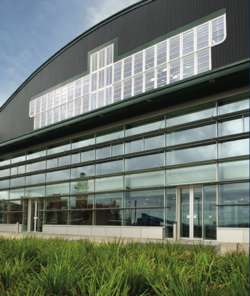Controlled rooflights provide low-energy thermal control for Littlewoods

Littlewoods Shop Direct Group is making use of a low-energy method of cooling its new headquarters in Liverpool using an innovative system developed by SE Controls. Originally an aircraft hangar from World War 2, this Grade 2 listed building has been refurbished to create 12 250 m2 of space. There are now three floors of office accommodation, with two new floors surrounding a central atrium. Variable-air-volume air conditioning provides heating and cooling for 52 zones. However, because of high heat gains through large roof lights on the top floor, an additional method of thermal control was needed. Working with building-services consultant Cudd Bentley, SE Controls installed and commissioned a series of OSO controllers and actuators to open and close 48 rooflights in the barrel-shaped roof. These controllers are linked to three, zoned modular OSO control panels, which provide an intelligent interface between the actuators and the building-management system, with communications using LonWorks. In peak summer conditions when the enthalpy of the air inside exceeds that of the air outside, the rooflights are opened to enable hot air at high level to be driven from the building via buoyancy forces assisted by the internal pressurisation derived by the second-floor supply air. This method of operation reduces fan energy and limits the temperature of the air constrained in the roof space and reducing heat gains to the occupied zone. The rooflights do not open more than 200 mm so as not to be visible above the roof line and spoil the aesthetics of the curved building.
Related links:


